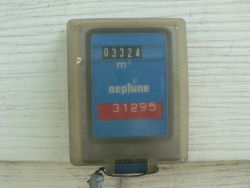Halifax Media Co-op
News from Nova Scotia's Grassroots
Living within a yearly water budget
The project of living sustainably can seem daunting at first. According to the New Economics Foundation in the UK, August 20 was global overshoot day for 2013: the day on which the human race exceeds the Earth's capacity to mitigate and account for our food consumption, water usage and pollution expenditure.
At Verge Permaculture they recommend we live within our solar budget for the year. That means, not overdrawing more water than falls on your personal chunk of land in a given year, and not using more energy than falls as sunlight on your house. This is also referred to as the solar economy: instead of drawing upon fossil energy and ancient aquafer water, we adjust our demand to fit within what the sun and the earth give is in a given year. Obviously this is a tall order but to me it felt like a handy place to start.
On the first day of every month, if I remember to, I record the total water used. On average it is 10m^3 or 10 thousand litres a month for cooking, dishes, drinking, washing clothes, showering, irrigating my garden in the dry months and flushing toilets. It seems like a lot, perhaps five bathtubs full.
Click here to find yearly average rainfall in your area from Environment Canada's website. Here's a hint: for Shearwater airport in Halifax it's 1421.4 mm average between years 1973 and 2013.
I found my house's roof area was roughly 101.8m ^2 by going out and measuring the length and width of the house with a tape measure (and then multiplying them together to find the area). Make sure your final area measurement is in metric.
Finally, multiply the mm of rain with the m^2 of the roof. The answer should come out in litres (.001 m x m^2 = .01 m^3 or 1L). I found out my roof collects an average of 144'698.5 L of water a year. That's 12'058.21 L a month.
It turns out that in a climate like ours we can afford with our roof space even to use flush toilets. We also live in a house and have a large roof area. Implications for those who live in apartment buildings would be more frugal. However for us it takes fossil energy to pump water up from the Grand Lake aquifer to the Hydrostone reservoire for downtown Halifax, let alone to treat the water before and after home use.
Reducing your water use directly saves energy and greenhouse gasses. Furthermore if you were saving rainwater for all your needs, reducing your water consumption would make it easier to accommodate fluctuations in seasonal rainfall and get you through the drier months.
During the month of September we used the humanure toilet without changing anything else and went from roughly 100 m^3 to 7 m^3. That's a decrease of more than 90%, and that should reflect a little on our power bill too. Further months of using a sawdust toilet and tracking our water expenditure will confirm whether this value is real and if we can maintain it.
To further reduce my water usage I could be staggering my shower (turning off the water to soap up). The next stop would be a front-loading washing machine, greywater use and better water management in my garden.
The media coop focusses on exposing class divides and injustice that other news outlets will not cover, but how can we reorient our lives to start supporting justice? How can we decouple from fossil fuels, and the pipelines, spills, fracking, global warming and human rights abuses associated with them? How can we end the oil addiction, relocalize production, create meaningful work and a truly lasting human ecology? In this column I hope to present solutions and create dialogue around permaculture. Feel free to ask your gardening and green living questions and I will answer.
The site for the Halifax local of The Media Co-op has been archived and will no longer be updated. Please visit the main Media Co-op website to learn more about the organization.



